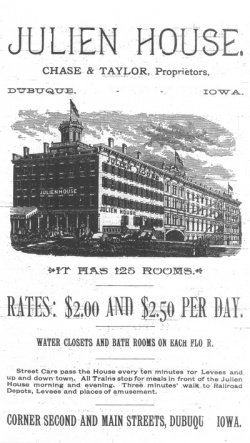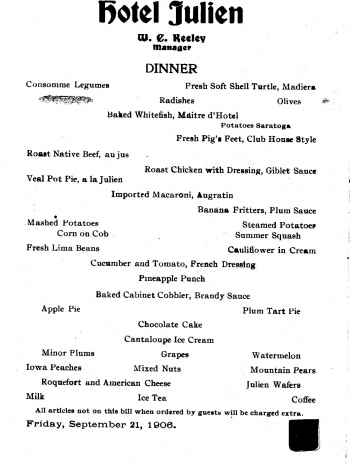Encyclopedia Dubuque
"Encyclopedia Dubuque is the online authority for all things Dubuque, written by the people who know the city best.”
Marshall Cohen—researcher and producer, CNN
Affiliated with the Local History Network of the State Historical Society of Iowa, and the Iowa Museum Association.
JULIEN MOTOR INN
JULIEN MOTOR INN. The site at Second and Main has been the location of an inn or hotel since 1844. The Waples House, the original building, was four stories tall and bore the name of its owner Peter WAPLES, a well-to-do Dubuque merchant.
In 1854 reconstruction, under the new ownership of a Mr. Burton and a Mr. Finlay, doubled the capacity of the hotel, renamed the Julien, to eighty rooms. The ownership of the hotel changed again in 1867 when it was purchased by W. W. Woodworth and his son-in-law, Dr. Charles A Reed. Additional remodeling in 1874 provided additional space on the eastern side of the hotel constructed in the style of RICHARDSONIAN ROMANESQUE ARCHITECTURE.
The old section of the Julien was demolished and rebuilt in 1889 to match the new section. The owners at that time included Frank D. STOUT and George Benjamin BURCH. The building, renamed the Julien Hotel, was a proud landmark in Dubuque that was not only an important center of commerce but a rival to Chicago in size.
Fire destroyed the Julien Hotel on April 13, 1913, with an estimated loss of $294,000. A group of local businessmen, including William H. DAY, George McLean, and Dorrance Dixon MYERS organized the Dubuque Hotel Company and construction quickly resulted in a new Julien Hotel. During the gangster era of PROHIBITION, it is alleged the hotel was owned by Alphonse CAPONE, the infamous mobster who often found Dubuque and East Dubuque safer territory than Chicago.
The Julien was purchased in 1962 by Louis PFOHL who ordered remodeling and brought many one-of-a-kind objects to the building including the famous Ziegfeld mirror in the present-day lobby. Gracing the dining room of the Alte Glocke Restaurant in the Julien are stained glass panels purchased by Pfohl through a demolition contractor in the late 1960s. The panels once graced a stone staircase in a Gothic mansion in New York City that was demolished to build a skyscraper. According to Pfohl, the owner of the mansion, Arthur Curtiss James, acquired immense wealth through investments in brass, copper, and RAILROADS.
Standing in a niche at the entrance off Second and Main STREETS is a life-sized statue of Julien DUBUQUE, commissioned by Pfohl from New York sculptor Barry Johnston. The sculpture was placed looking toward the MISSISSIPPI RIVER because of an account that Dubuque once had a hut near where the Inn stands.
See: HOTEL JULIEN DUBUQUE






